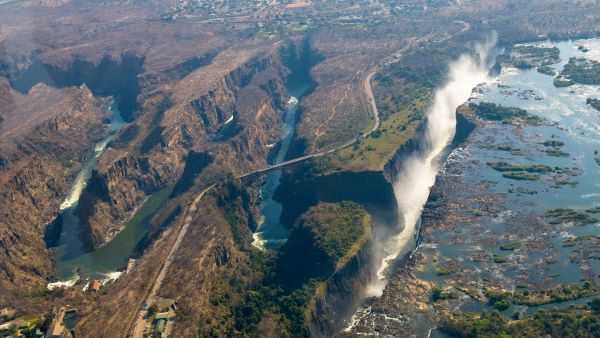Mosi-Oa-Tunya (Smoke that Thunders) National Park is located along the upper Zambezi River. It includes the Victoria Falls and extends about 12 kilometers upstream from the falls. This site is a UNESCO World Heritage Site, and its counterpart across the border is the Victoria Falls National Park. With an area of 66 km², the park is considered the smallest park in Zambia. The park is home to miombo (dry) forest and is inhabited by a large number of birds and mammals including antelope, white rhino, hippo, crocodile and an amazing variety of bird species. Swimming, scenic drives, forest walks and safaris: there is no doubt that there is plenty to do besides visiting the spectacular falls.
Land of safaris crossed by a mythical river, just the name of this country sounds like a dream!
In the same area as much more tourist destinations, going to Zambia will definitely take you away from classic tourist circuits: adventure and authenticity are always there! Of course, the main attraction of Zambia is undoubtedly the Victoria Falls, which it shares with Zimbabwe but those who visit this country remain fascinated by the richness of its fauna (whether during a walking safari, on a river cruise or on a vehicle safari) and have the chance to explore a remote and bewitching wilderness…
Advice
- Prepare your trip properly: Zambia remains a country with poor roads and where travel is not as easy as in its neighbouring countries. It is necessary to anticipate travel times between 2 areas or to allow the budget to travel by plane...
- The meeting between the Zambezi and the Chobe river is a crossroads of 4 countries: Botswana in the South, in the West, Namibia, in the East Zimbabwe and in the North, of course, Zambia… it is quite easy to combining Zambia with a stay in the Caprivi strip (Namibia), Chobe National Park in Botswana or even North-West Zimbabwe (Vic Falls and Hwange National Park)
Formalities
A valid passport 6 months after the entry date of stay in Zambia is required.
Tourist visas are available at major airports, ports and borders. However, you must obtain a Zambian visa in advance if you arrive by train or boat from Tanzania.
- All foreign visitors - with the exception of nationals of the Southern African Development Community (SADC) countries, for whom the visa is free - pay US $ 50 for a single entry visa (up to 1 month ) and US $ 80 for a multiple entry visa (up to 3 months, interesting if you want to go to one of the neighboring countries). Multiple entry visa applications (US $ 80) must be made in advance to a Zambian Embassy or High Commission. If you stay less than 24 hours - for example to visit Livingstone from Zimbabwe - you will only pay US $ 20.
- Payment can be made in US dollars and sometimes in pounds sterling. If other currencies are sometimes accepted at the borders (Euro, South African rand, Botswana pula, Namibian dollar), it is better not to count on it.
- If you wish to combine your stay in Zambia with a stay in Zimbabwe, it is possible. A bilateral agreement between the two countries has resulted in the creation of KAZA visas. Priced at $50, it gives you access to both countries at the same time for a period of 30 days. It is very useful to go from one country to the other, especially if you intend to visit the Victoria Falls. Be careful though, this visa must be obtained on the spot when arriving at certain airports in these two countries, or at the border posts between the two countries.
Health
Yellow fever vaccine is compulsory only if you have been in a country where it is rampant. To see the list, visit the Institute Pasteur website.
https://www.pasteur-lille.fr/sante/informations-maladies-voyageurs/
The following vaccines are recommended: DTP (update), typhoid fever, hepatitis A and B, bacterial meningitis A + C + Y + W135.
Dengue and malaria are diseases transmitted by mosquito bites, protect yourself with sprays for skin and clothing.
For malaria, you should also take preventive treatment before, during and after your stay.
Cholera is present in Zambia, so do not drink tap water but only bottled water. Also avoid eating raw or uncooked foods. Finally wash your hands thoroughly before each meal.
When to go?
Zambia being a subtropical country in its highest and tropical zones in its valleys and on the edge of lakes, it is hot throughout the year.
Zambia has a rainy season that runs from November to April with local variations. Nature is green again, but the roads are very difficult to navigate, which often becomes impractical.
End of May-beginning of October, it is the dry season, ideal time to observe the fauna; it is definitely the peack season.
From June to August, the weather is generally dry, the temperatures are cooler and the nights sometimes very cold.
Currency
- The currency of Zambia is the Zambian Kwacha (ZMW). In March 2023, 1 € = 22.30 ZMW and 10 ZMW = 0.44 €.
- Payment in dollars or euros can be accepted.
- Visa or American Express payment cards are normally accepted in shops and services in large cities or in tourist areas - it is nevertheless advisable to inquire before.
- Only Visa cards allow cash withdrawals at ATMs.
- Travelers checks are not accepted
